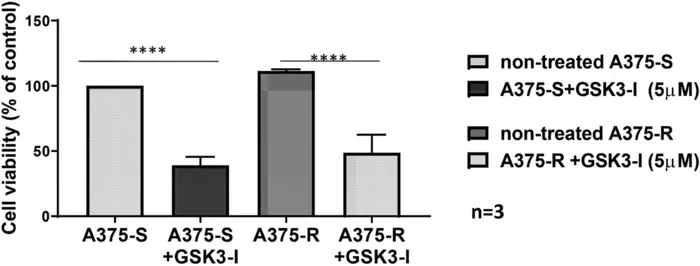In the complex landscape of cancer treatment, drug resistance remains a formidable challenge, especially in melanoma, a type of skin cancer that has seen alarming rates of resistance to therapies targeting the BRAF gene. Research led by a team from the University Hospital Ulm has delved into this issue, revealing an unexpected player in the drama of melanoma resistance: GSK3β, or glycogen synthase kinase 3 beta. Their recent findings indicate that the activation of GSK3β could be a critical factor in the development of resistance to BRAF inhibitors, which are widely used in treating patients with BRAF mutations.
BRAF inhibitors like Dabrafenib have revolutionized the treatment of BRAF-mutant melanoma by initially shrinking tumors and extending survival. However, as with many targeted therapies, the efficacy of BRAF inhibitors is often short-lived due to the eventual emergence of drug resistance. The newly published perspective in Oncotarget emphasizes that understanding the mechanisms by which melanoma cells evade therapeutic agents is crucial for developing more effective treatment strategies. This research sheds light on GSK3β’s role in enhancing the survival of melanoma cells in the face of BRAF inhibition, suggesting that it may serve as a novel therapeutic target.
In laboratory experiments, the team demonstrated that melanoma cells treated with Dabrafenib eventually developed resistance. Interestingly, these resistant cells exhibited higher levels of GSK3β activation, suggesting a link between the drug resistance phenotype and altered signaling pathways promoting cell survival. By employing a GSK3β inhibitor, specifically LY2090314, researchers found that they could significantly reduce the growth of BRAF inhibitor-resistant melanoma cells. This result is promising, as it suggests a potential strategy for overcoming resistance by reinstating sensitivity to BRAF-targeted therapies.
One of the most striking aspects of the study is how GSK3β’s role extends beyond simple metabolic regulation. In addition to its well-documented functions, the research hints at a more sinister role of GSK3β in supporting melanoma cell fitness and adaptation during therapy. This indicates a potential paradigm shift where treatment approaches must not only target the primary oncogenic drivers but also address the adaptive mechanisms that cancer cells employ in response to therapy.
The findings are significant as they expose the multifaceted nature of drug resistance. Traditional views of cancer resistance have often concentrated on genetic mutations that confer survival advantages to tumor cells. However, this research suggests that epigenetic modifications and the plasticity of signaling networks can be equally important in fostering therapeutic resistance. By pinpointing GSK3β as an influential player in melanoma resistance, the authors open up avenues for future research focused on combinatorial therapies that leverage both BRAF inhibition and GSK3β suppression.
Clinical implications of these discoveries could be profound. Given that GSK3β inhibitors like LY2090314 are already being tested in clinical settings for other cancer types, there is potential for rapid translation of these findings into clinical practice. This addresses a pressing need in oncology: to provide robust options for patients whose tumors have become resistant to current frontline therapies.
Moreover, the research revives debates around the role of the tumor microenvironment in shaping cancer behavior. Factors such as cytokines, extracellular matrix components, and cell-cell interactions may influence GSK3β activation in melanoma, warranting further investigation into how the microenvironment could be manipulated to enhance the efficacy of existing treatments.
In essence, the study reveals that the narrative of melanoma treatment is far from finished. The activation of GSK3β highlights the need for continued efforts to dissect the complexities of signaling pathways that tumors exploit for survival. Understanding these mechanisms not only enhances our biological knowledge but also aligns with the goal of personalized cancer therapies tailored to individual tumor profiles.
The overarching message is clear: overcoming resistance in melanoma necessitates a multifaceted approach that integrates insights from molecular biology, pharmacology, and clinical research. The elevation of GSK3β as a significant factor in BRAF inhibitor resistance underscores the inevitability of evolving treatment paradigms in cancer therapy. As scientists decode the labyrinth of cancer biology, it becomes increasingly evident that the war against melanoma and other cancers is multi-dimensional, requiring ingenuity, collaboration, and relentless innovation.
Future studies are anticipated to expand upon these findings, exploring whether targeting GSK3β could be an effective strategy across other forms of cancer exhibiting drug resistance. With resistance mechanisms varying widely among different cancers, researchers must remain vigilant in their pursuit of effective therapies that ensure long-term efficacy and patient survival. The path forward may well depend on integrating GSK3β inhibitors with current treatment regimens, offering new hope in the fight against a disease that continues to challenge the limits of modern medicine.
As the scientific community continues to unravel the complexities of GSK3β in cancer, the research from the University Hospital Ulm stands as an important milestone. It emphasizes the essential collaboration between basic research and clinical application, highlighting the potential for novel therapies to emerge from a clear understanding of cancer’s adaptive survival strategies. The hope is that these insights will pave the way for improved outcomes for melanoma patients, particularly those facing the dire circumstances of treatment resistance.
In conclusion, the increase in GSK3β activity during BRAF inhibitor treatment raises critical questions about the adaptive responses of melanoma cells. The findings advocate for a fresh perspective in combating drug resistance, ultimately aiming to refine therapeutic strategies that empower patients while addressing the ever-evolving landscape of cancer biology.
Subject of Research:
Cells
Article Title:
GSK3β activation is a key driver of resistance to Raf inhibition in BRAF mutant melanoma cells
News Publication Date:
4-Apr-2025
Web References:
Oncotarget
References:
N/A
Image Credits:
Copyright: © 2025 Crisan et al. This is an open access article distributed under the terms of the Creative Commons Attribution License (CC BY 4.0).
Keywords:
cancer, BRAF melanoma resistance mechanisms, GSK3β, BRAF mutation, drug resistance, targeted therapies, melanoma treatment.




